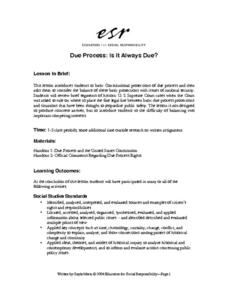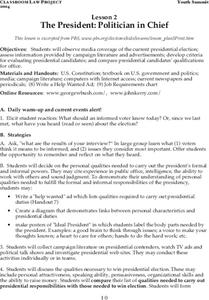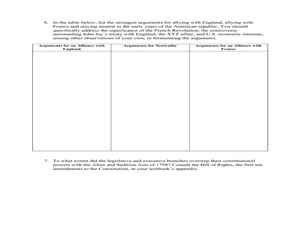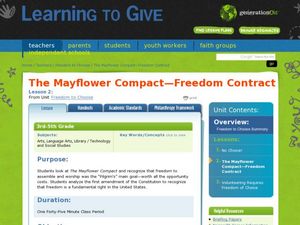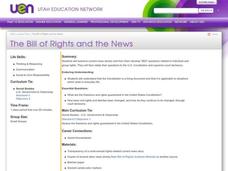Curated OER
Race and the United States Constitution
Students examine the topic of race within the United States Constitution. Using case texts, they analyze how the documents deal with the issue of race. In groups, they explore the Court's definitions of citizen. They create a poster...
Curated OER
It is Our Right-Don't Waste It!
Students explore the basic rights granted to all American citizens by the U.S. Constitution in the light of women's issues. The women's suffrage movement, the role of Susan B. Anthony, and the timeline of events on voting rights are...
Curated OER
Due Process: Is It Always Due?
Students explore the basic Constitutional protections of due process and then consider the balance of these basic protections with issues of national security. A variety of segments of U.S. Supreme Court cases are examined in this lesson.
Curated OER
U.S. Voting Amendments: Crossword Puzzle
In this United States history worksheet, students use the 13 clues in order to fill in the crossword puzzle with the appropriate voting Amendment answers.
Curated OER
Nativist and Racist Movements in the U.S. and their Aftermath
Students examine the nativist and racist movements in the history of the United States. In groups, they analyze the reactions of religious and ethnic groups to these movements and create a chart to compare the goals of each group. To...
Curated OER
Bill of Rights
In this history worksheet, learners demonstrate what they know about the U.S. Bill of Rights. Students use the letters BILL OF RIGHTS to start each sentence or phrase about the Bill of Rights.
Curated OER
The U.S. and Iroquois Constitutions
Students receive and interpret copies of US Constitution and Iroquois Constitution. Then they reference (look up) the articles mentioned by Daly in the Iroquois Constitution text, and analyze for parallel meaning in the US Constitution....
Curated OER
U.S. Government & Indian Nations
Pupils explain the Constitutional basis of the Federal Indian relationship. They summarize the Constitutional references to American Indians, and evaluate the importance of the Northwest Ordinance of 1787. They examine Utah's struggle...
Curated OER
The President: Politician in Chieft
Students explore the role of the U.S. President and the media coverage in presidential elections. They discuss what it means to be informed, the issues they consider most important, and reflect on what they learned from their interviews....
American Bar Association
What Is Separation of Powers?
Who has the power? Scholars investigate the creation of the three branches of government in the United States Constitution. They analyze just why the framers created the branches the way they did.
Curated OER
The Declaration Versus The Communist Manifesto
Upper graders put their knowledge of the U.S. Constitution to the test when they are asked to mark which of several statements are from either the Constitution or the Communist Manifesto. A class discussion follows. Use this resource as...
Curated OER
The Ongoing Debate: Crime Control v. Due Process Protection
Students investigate the Exclusionary Rule and other ways of to enforce the protections found in the Bill of Rights. They study how effective criminal control and public safety is carried out while citizens Constitutional rights are...
Curated OER
Foundations of American Government: Teacher’s Guide
Students explore the foundations of America. In this early American history lesson, students watch Discovery video segments regarding the Boston Massacre, the Declaration of Independence, the U.S. Constitution, and the Bill of Rights....
Curated OER
The American People, “Creating a Nation”
In this early American history worksheet, students read noted pages in their textbooks and then respond to 7 short answer questions regarding the U.S. Constitution and its formation.
Curated OER
The Mayflower Compact: Freedom Contract
Students read historical documents. In this freedom lesson, students discuss the freedoms they have, such as whom to play with at recess, and how the pilgrims must have felt when they landed in America. Students read The Mayflower...
Curated OER
History of Supreme Court
Learners study the role of the U.S. Supreme Court in U.S. history. They explore current events about the U.S. Constitution and discuss the Marbury v. Madison case from 1803. They identify the term "judicial review" and judicial...
Curated OER
The Bill of Rights and the News
Students examine current news stories and from them develop "BIG" questions related to individual and group rights. They then relate their questions to the U.S. Constitution and supreme court decisions.
Curated OER
The Formation and Function of the Supreme Court
Students analyze the role of the U.S. Supreme Court. They read a handout and Article III, section 1 of the Constitution, analyze and rate by relevance noteworthy Supreme Court cases, and write how they decided each rating.
Curated OER
Powerful Signatures
Students experience famous historical documents that were initiated and propelled by signatures such as Declaration of Independence, U.S. Constitution. They create a school amendment using the information gathered.
Curated OER
Sow the Seeds of Victory!
Students use the National Archives and Records Administration's records to research the history of the U.S. Food Administation.
Curated OER
The U.S. & Navajo Bills of Rights
Middle schoolers are introduced to the United States and Navajo Bill of Rights. In groups, they compare and contrast the two documents and take notes to share with the class. To end the lesson, they write in their journals about their...
Curated OER
the Impact of the U.s. Supreme Court on High School Journalism.
Learners study of the First Amendment, Tinker, Hazelwood and the Colorado Student Free Expression Law. They discuss the ramifications on the student press and recite their memorized First Amendment rights. They discover what can...
Curated OER
Individual Rights
Students study the individual rights enshrined in the U.S. Constitution. They determine where these rights come from, and why we value them as we do. They consider that our individual rights are not absolute, and may be limited by other...
Curated OER
When Property Rights and the Public Good Clash
Students analyze a case involving a government's use of eminent
domain powers to construct a comprehension of property rights and how they might be viewed as essential protections for citizens in a constitutional democracy. They Use the...




